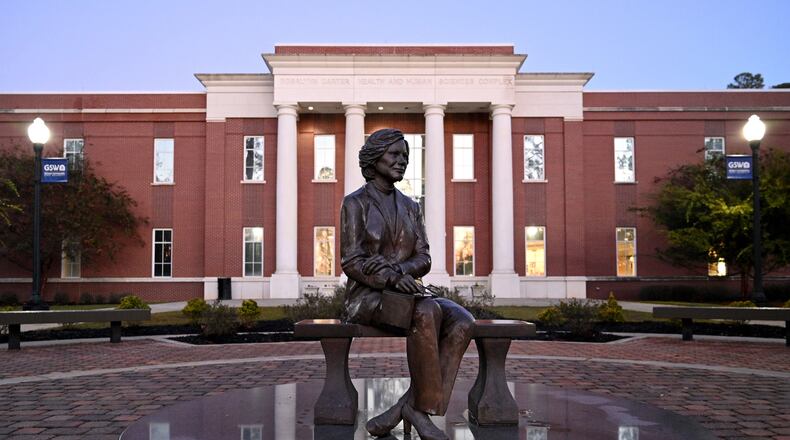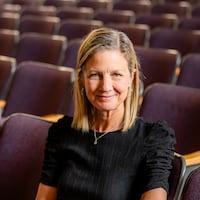AMERICUS — You don’t have to walk far on Georgia Southwestern State University’s campus to see and feel Rosalynn Carter’s impact.
A set of buildings in the middle of campus is named the Rosalynn Carter Health and Human Sciences complex. That’s where you’ll find the caregivers institute she founded. And a campus club she founded, the Young Democrats, is still up and running.
“To be able to continue a legacy that she started is just incredible,” said the club’s president, Frederick Wright.
Wright, a junior and political science major, said he was impressed by the way the former first lady embraced her alma mater throughout her life.
“It’s really rare that you would see people who have been to the White House to come back to their community and just do the things that normal people would do,” he said. “But she was a person who was steadfast in (her) community.”
As a nearly lifelong resident of South Georgia, Rosalynn Carter served as a church deacon and frequented local businesses and restaurants in her hometown of Plains and nearby Americus.
On Monday, the Carter family motorcade traveling with Rosalynn Carter’s remains stopped at the university in Americus to lay wreaths, one of several memorial services this week. The former first lady, and wife of former President Jimmy Carter, died Nov. 19 at the age of 96.
Jason Berggren, a political science professor at Georgia Southwestern State University, said Rosalynn Carter was a shrewd politician.
“In fact, I would say in 1980, she ran the (presidential) campaign,” he said. “(Jimmy) did the Rose Garden strategy. She did the Rosalynn strategy.”
Berggren took a job teaching at GSW for the express purpose of studying the Carters. He points out that in 1980, the then-first lady traveled to Iowa, New Hampshire and Florida to campaign for her husband.
“She was a practitioner of our democracy and democracy is about participating in our system, campaigning for the issues that you care about and campaigning for the candidates you care about, and in her case that was her husband and his agenda,” Berggren said.
GSW is located about 10 miles northeast of Plains, where Rosalynn and Jimmy Carter were born.
The university has been through several changes over the years, including name changes. When Rosalynn Carter attended the school, graduating in 1946, it was called Georgia Southwestern College. It was a junior college at the time, but now is a four-year institution that is part of the state’s public university system.
Both Rosalynn and Jimmy Carter attended the school and have shown support for it over the years. GSW President Neal Weaver said the caregiving program Rosalynn Carter founded at the school in 1987 is unique because it connects nursing, caregiving and the economics of providing long-term care.
“We have a program that we think prepares students unlike any other students in the country, and that makes them more employable, that makes them better advocates for their patients ... it’s an incredible resource that does great work, but has also established a real unique niche for the university,” he said.
When Rosalynn Carter spoke about the importance of caregiving, she often said there are four kinds of people: Those who are caregivers, those who were caregivers, those who will be caregivers and those who need caregivers.
Jennifer Olsen, CEO of the Rosalynn Carter Institute for Caregivers on campus, said that’s why the institute’s work is critical.
“Your friend, your neighbor is going to need care for disability as they age, an accident or an illness, and we all have a role to play, and this ties into Mrs. Carter’s broader focus on creating a more caring society,” Olsen said. “Our job is to continue her legacy and to continue supporting caregivers.”
About the Author
Keep Reading
The Latest
Featured



